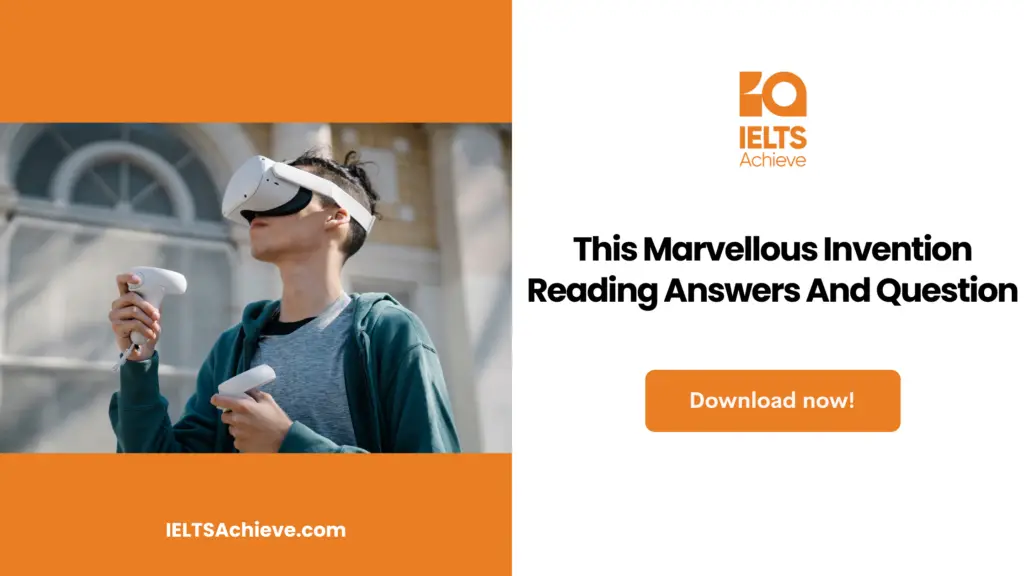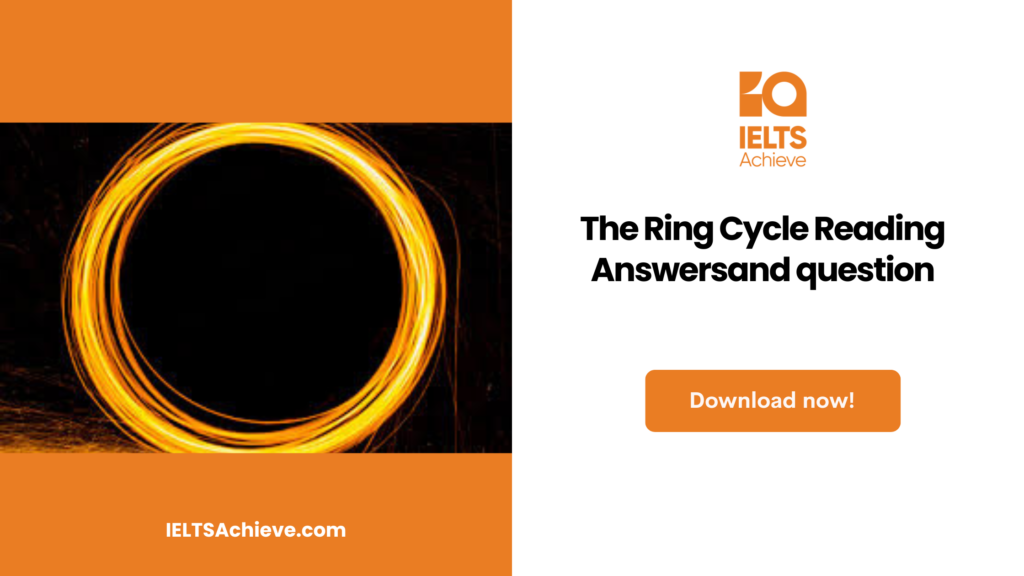The Blog post contains the following IELTS Reading Questions:
- IELTS Reading Matching Headings.
- IELTS Reading Summary Completion.
- IELTS Reading Yes/No/Not Given.
Stay informed and prepared for success – Explore our comprehensive Reading Test Info page to get valuable insights, exam format details, and expert tips for mastering the IELTS Reading section.
IELTS Reading Passage – This Marvellous Invention

This Marvellous Invention
Language must be given honourable mention among all of humanity’s many creations. Our material existence may have been changed by other discoveries like the wheel, agriculture, and sliced bread, but the development of language is what gave rise to the human race. All other inventions are insignificant in comparison to language because language is the foundation of all human achievement. Without language, humans would not have been able to begin our ascent to unmatched dominance over all other animals and even over nature.
Language is important, but not just because it was the first. Although it is based on a concept of brilliant simplicity, it is a tool of extraordinary sophistication in its own right: “This marvellous invention of making out of twenty-five or thirty sounds that infinite diversity of statements which, although in themselves having no likeness to what is in our mind, allow us to expose to others its full secret, and to make known to those who cannot fathom it all that we envisage, and all the many stirrings of our soul.” No one has subsequently praised the magnitude of this achievement more eloquently than the famed French grammarians of the Port-Royal convent near Versailles who did it in 1660. There is only one problem in all of these hymns of praise, however, as the devotion to each language’s singular achievement obscures a little but crucial incongruity. The greatest innovation of mankind is language, except that it was never created. Our interest with language stems from this apparent paradox, which also holds many of its secrets.
Language frequently appears to be so expertly crafted that it is difficult to picture it as anything other than the refined workmanship of a master craftsman. How else could this instrument produce such a large amount of sound from just thirty-two meagre sound bites? These mouth shapes—p, f, b, v, t, d, k, g, sh, a, e, and so on—amount to nothing more than a few careless spits and sputters, meaningless noises that are incapable of expression or explanation. However, if you run them through the gears and cogs of the language machine and arrange them in some very precise orders, there is nothing that these useless streams of air cannot accomplish, from unravelling the fundamental order of the cosmos to signifying the endless boredom of existence.
The most amazing thing about language, though, is that everyone can use it; they don’t need to be geniuses. Everyone, from pre-modern foragers in the subtropical savannah to post-modern thinkers in the sprawling suburbs, can weave these meaningless sounds together into an unlimited number of delicate perceptions, all seemingly without exerting the least effort. However, because language’s victories are typically taken for granted in daily life, it is precisely this misleading ease that becomes language a victim of its own success. The wheels of language move so smoothly that one rarely thinks to pause and think about all the inventiveness and expertise that must have gone into making it tick. Language hides the arts.
Often, the marvel of language design is only realized when one becomes alienated by foreign tongues and all of their bizarre and unusual aspects. Some languages have the power to construct words that are so long that they are literally impossible to breathe, expressing in one word what it would take an English speaker a full phrase to utter. To give one example, the Turkish phrase şehirliliçtiremediklerimizdensiniz literally translates to “you are one of them who we can’t change into a town-dweller.” (In case you were wondering, this monstrosity is actually just one word, not just a bunch of words crammed together; most of its constituent parts can’t even support itself.)
If you think that’s a one-off freak, think of Sumerian, which was used by people who established writing and allowed for the recording of history some 5,000 years ago on the Euphrates riverbanks. In comparison to the Turkish colossus above, a Sumerian phrase like munintuma’a (‘when he had made it suited for her’) could appear relatively trim. Contrarily, the economical compactness of its construction, not its length, is what makes it so stunning. The term is made up of various slots, each of which corresponds to a distinct semantic component. Due to this sophisticated design, even the lack of a sound may be used to portray a specific idea. Single sounds can even be used to provide useful information. The answer would have to be nothing if you were to inquire as to which portion of the Sumerian term corresponds to the pronoun “it” in the English translation “when he had made it acceptable for her.” But not just any nothing—the nothing that occupies the empty space in the middle, to be exact. The technology is now so refined that, when positioned precisely in a given location, even an inaudible object can perform a specific task. Who could possible have come up with such a nifty contraption?
Unlock your full potential in the IELTS Reading section – Visit our IELTS Reading Practice Question Answer page now!
Recommended Questions:
Renewable Energy IELTS Reading Question with Answer
This Marvellous Invention IELTS Reading Questions
Question 1-6
Reading Passage has six paragraphs, A-F. Choose the correct heading for paragraphs A-F from the list of headings below. Write the correct number, i-vii, in boxes 1-6 on your answer sheet.
list of Headings
- Language variations highlight how outstanding they are.
- how a small number of sounds can be arranged to represent a wide variety of meaning
- why various languages don’t use the same sounds
- Apparently conflicting linguistic traits
- Even a moment of silence has value.
- Why the development of language is the most significant one ever
- the shared capacity for language
1 Paragraph A
3 Paragraph C
4 Paragraph D
5 Paragraph E
6 Paragraph F
Ready to conquer Matching Headings questions? Click here to learn essential tips and techniques for matching headings accurately to paragraphs or sections in the IELTS Reading section.
Question 7-10
Complete the summary using the list of words, A-G, below. Write the correct letter, A-G, in boxes 9-10 on your answer sheet.
The importance of language
The development of the wheel had a significant impact on 7…….. facets of life, but no other invention had an impact as 8……. as language.Despite having only a few sounds, language is very 9……. It seems that language is 10….. to use. But its sophistication is frequently disregarded.
A difficult
B complex
C original
D admired
E material
F easy
G fundamental
Boost your performance in Summary, Notes, Table, and Flowchart Completion tasks. Click here to explore our detailed guide and learn how to effectively complete summaries, notes, tables, and flowcharts in the IELTS Reading section.
Question 11-14
Do the following statements agree with the views of the writer in Reading Passage? In boxes 11-14 on your answer sheet, write
YES if the statement agrees with the views of the writer
NO if the statement contradicts the views of the writer
NOT GIVEN if it is impossible to say what the writer thinks about this
11. Human beings might have achieved their present position without language.
12. The Port-Royal grammarians did justice to the nature of language.
13. A complex idea can be explained more clearly in a sentence than in a single word.
14. The Sumerians were responsible for starting the recording of events.
Want to excel in identifying the writer’s views and claims? Click here to explore our in-depth guide on how to accurately determine Yes, No, or Not Given in the IELTS Reading section.
Unlock your full potential in the IELTS Reading section – Visit our IELTS Reading Practice Question Answer page now!
Recommended Questions:
Renewable Energy IELTS Reading Question with Answer
This Marvellous Invention Reading Answers
1. vi
2. iv
3. ii
4. vii
5. i
6. v
7. E
8. G
9. B
10. F
11. NO
12. YES
13. NOT GIVEN
14. YES

We hope you found this post useful in helping you to study for the IELTS Test. If you have any questions please let us know in the comments below or on the Facebook page.
The best way to keep up to date with posts like this is to like us on Facebook, then follow us on Instagram and Pinterest. If you need help preparing for the IELTS Test, join the IELTS Achieve Academy and see how we can assist you to achieve your desired band score. We offer an essay correction service, mock exams and online courses.

